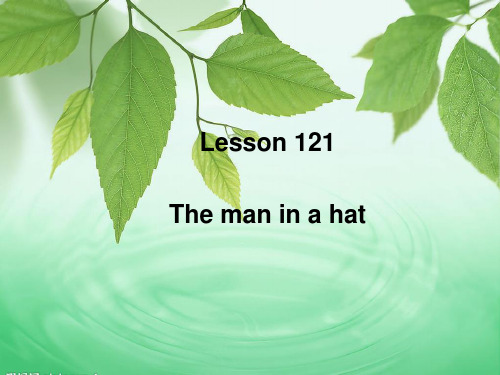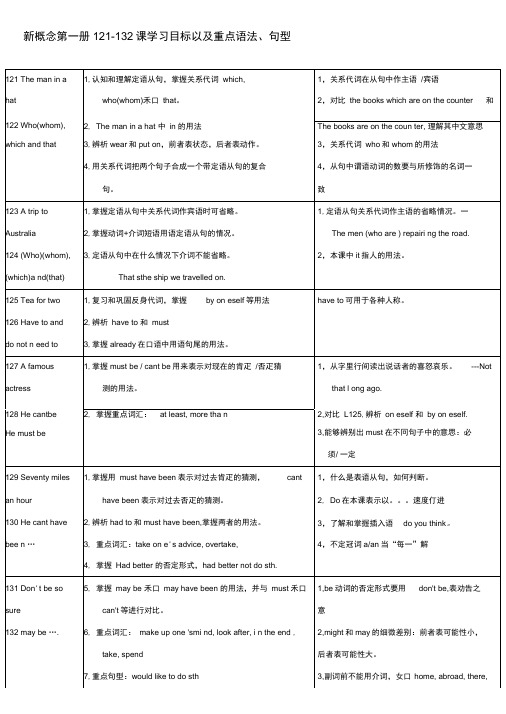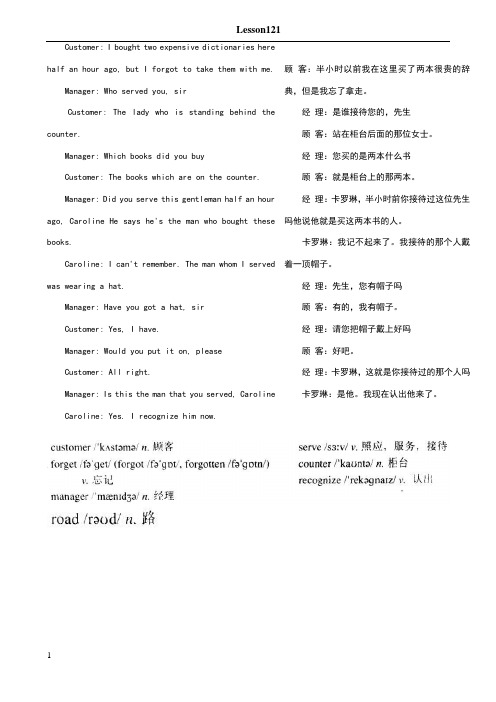新概念一册Lesson121
新概念课堂笔记第一册Lesson121-122

新观点英语讲堂笔录第一册Lesson 121-122Word Studycustomer【用法】 n. 客【展】 custom n. 俗,例;customs n. 海关customs officer海关官forget【用法】 vt. 忘(forgot - forgotten)【】 forget sb./sth. 忘某人 /某物forget to do sth. 忘去做某事forget doing sth.忘做某事forget + 疑+ to do【例句】 I forgot her telephone number.我忘了她的号Don ’t forget to lock the door before you leave home. 离家前忘了。
I ’ ll never forget seeing the opera in Beijing. 我永也忘不了在北京看的那歌。
I forget how to spell this word. 我忘了怎样拼写个。
【反】 remember v. 得manager【用法】 n. 理【展】 manage v. 管理【构】 manage + -er →manager【】 manager to do sth. 法做成某事serve【用法】 v. ○1服,招待;服侍○2供;出(食品或料等)○3⋯⋯服 /服役;任【】 serve the people 人民服serve as 充任,担当;【展】 service n. 服servant n. 仆人【例句】 The shop owner hurried to serve her. 店东赶去招待她。
A young waiter served them. 一位年的侍从服侍他餐。
Serve it to the ladies first.把它先端女士。
The hotel serves breakfast at 7 a.m. every morning. 个店每日清晨 7 点供早。
新概念英语NCE1_lesson121-122(共27页)课件

• CUSTOMER: I bought two expensive dictionaries here half and hour ago, but I forgot to take them with me.
• MANAGER: Who served you, sir? • CUSTOMER: The lady who is standing behind the counter. • MANAGER: Which books did you buy? • CUSTOMER: The books which are on the counter. • MANAGER: Did you serve this gentleman half an hour ago,
邮件还没发) • ②I forget sending an email to him.(忘记已经发过
了,邮件已经发出了)
• 3.serve :[sə:v] v. • (1)服务;接待;侍候:
• Are you being served, sir? • 先生,有人为您服务吗?
• A young waiter served them. • 一位年轻的侍者侍候他们进餐。 • (2)供给;摆出(食物或饮料等):
• 2.put it on,戴上它。
• 这里的 it指 a hat,以避免重复。 put on是“戴上”、“穿上”的意思。 假如它的宾语是一个名词,这个名词 可放在 put on之后,也可放在put和on 之间。假如是代词,就必须放在put和 on 之间。如:
• Put on your coat./Put your coat on. 穿 上外衣。但只能说:Put it on. 把它穿 上。
• What time is breakfast served in this hotel? • 这个饭店里什么时候供给早餐?
新概念英语一lesson121-122(共46页)

4.Do you know the cinema that near the busstop?
先行词为人, 先行词为人, 先行词为物, 先行词为物,
做主语
做宾语
做主语
做宾语
who
whom
which
that
找出本课中的定语从句
to take them with me.
take sth with sb 把某物带走 I took some medicine with me when I went
to the village. 我去那个村庄的时候我随身带了一些药。
take sb sth = take sth to sb 把某物拿去给某人 我将给我在北京的朋友们带一些礼物。 I’ll take some presents to my friends in
Do you_r_e_c_o_g_n_i_z_e(认出) him now? I _f_o_r_g_e_t (忘记) to send an email to him A young waiter __s_e_rv_e_d_(服务) them yesterday. _C_u_s_t_o_m__e_r __(顾客) is god. I bought the watch at the _c_o_u_n_t_e_r_(柜台).
在一个句子中,定语成分由一个句子来充当, 那么这个句子被叫做定语从句。 被定语从句所修饰的词叫做先行词, 定语从句要紧跟在先行词之后。 定语从句要由关系代词who, whom, that,which引导。
关系代词who, whom的用法 二者都用于指人。who在定语从句中做 主语,宾语都可以。whom在定语从句中 只能做宾语。
新概念第一册重点及重要句型121

新概念第一册121-132课学习目标以及重点语法、句型who ,①(先行词)人+ who/that + 动词(作主语)The man who has white hair is .②(先行词)人 +whose +名词+动词(作定语)I have a friend whose father is a teacher.③(先行词)人 + who/whom/that + 及物动词/不及物动词 +介词(做宾语)The man we met is my uncle.④(先行词)物 + which/that + 动词(作主语) Lesson 121 & 122 The man in a hat 戴帽子的男士重点句型:在作业本上抄写重点句型,并翻译成汉语: 1. Who served you, sir .2. The lady who is standing behind the counter.3. Is this the man that you served, Caroline4.1 recognize him now.5. She is the woman who I served yesterday. 重要语法一一定语从句定语从句像形容词一样起修饰作用 ,但位于所修饰的名词之后。
定语从句由关系代词引导,紧跟在它所修饰的成分后面。
关系代词 whom 与that 修饰人,which 与that 修饰东西。
关系代词指代从句的主语或宾语,同时又充当连接词,把从句和主句连接起来1、关系代词: who, whom, whose, which, thatwhich 是指人以外的生命或没有生命的东西.:This is the bird which always sings at night. ⑤(先行词)物 +which/that + 主语 + 及物动词(作宾语) .:This is the letter I received yesterday.2、定语从句中的省略① 当关系代词代表主语并且从句中的谓语动词是(现在)进行时时态时,关系代词及助动词 be 均可省略② 如果关系代词在从句中作动词或介词的宾语,关系代词往往可以省略。
新概念英语第一册第121课Lesson121课文单词知识点

v1.0 可编辑可修改Lesson121Customer: I bought two expensive dictionaries herehalf an hour ago, but I forgot to take them with me.Manager: Who served you, sirCustomer: The lady who is standing behind the counter.Manager: Which books did you buyCustomer: The books which are on the counter.Manager: Did you serve this gentleman half an hour ago, Caroline He says he's the man who bought these books.Caroline: I can't remember. The man whom I served was wearing a hat.Manager: Have you got a hat, sirCustomer: Yes, I have.Manager: Would you put it on, pleaseCustomer: All right.Manager: Is this the man that you served, Caroline Caroline: Yes. I recognize him now.顾客:半小时以前我在这里买了两本很贵的辞典,但是我忘了拿走。
经理:是谁接待您的,先生顾客:站在柜台后面的那位女士。
经理:您买的是两本什么书顾客:就是柜台上的那两本。
经理:卡罗琳,半小时前你接待过这位先生吗他说他就是买这两本书的人。
卡罗琳:我记不起来了。
我接待的那个人戴着一顶帽子。
经理:先生,您有帽子吗顾客:有的,我有帽子。
新概念英语第一册自学笔记含课后练习答案:Lesson 121-122

新概念英语第一册自学笔记含课后练习答案:Lesson121-122新概念英语第一册121-122课课文重难点 further notes on thetext1.…but i forgot to take them with me.……但是我忘了拿走。
forget to do sth.表示“忘了做某事”,them指两本字典。
2.put it on,戴上它。
这里的 it指 a hat,以避免重复。
put on是“戴上”、“穿上”的意思。
如果它的宾语是一个名词,这个名词可放在 put on之后,也可放在put和on之间。
如果是代词,就必须放在put和on 之间。
如:put on your coat./put your coat on.穿上外衣。
但只能说:put it on.把它穿上。
新概念英语第一册121-122课语法知识点 grammar in use定语从句定语从句像形容词一样起修饰作用,但位于所修饰的名词之后。
定语从句由关系代词引导,紧跟在它所修饰的成分后面。
关系代词 who,whom与 that修饰人,which与 that修饰东西。
关系代词指代从句的主语或宾语,同时又充当连接词,把从句和主句连接起来。
请看例句:(1)关系代词作从句的主语(who/which/that):the dog which/that is carrying the basket is mine.叼着篮子的那只狗是我的。
he's the porter who/that carried my suitcase.他就是那个扛着我的衣箱的搬运工。
(2)关系代词作从句的宾语(whom/that/which):they're the windows which/that the children broke yesterday.这些就是孩子们昨天打碎的窗户。
she's the lady whom i served yesterday.她就是我昨天服务过的那位女士。
新概念英语课件第一册第121课NCE1Lesson121,122

The man in a hat
CUSTOMER: I bought two expensive dictionaries here half and hour ago, but I forgot to take them with me. MANAGER: Who served you, sir? CUSTOMER:The lady who is standing behind the counter. MANAGER: Which books did you buy? CUSTOMER:The books which are on the counter. MANAGER: Did you serve this gentleman half an hour ago, Caroline? He says he's the man who boughr
customer
road for get forget
忘记就是为了得到。 manage r manager
serve
re
cog
nize(无意义)
recognize
吻合,一致
又吻合了,所以我才认出来。
Unit 61
1
3
2
4
•
Don’t forget to lock the door.
CAROLINE: I can't remember. The man who I served was wearing a hat. MANAGER: Have you got a hat, sir? CUSTOMER:Yes, I have. MANAGER: Would you put it on, please? CUSTOMER:All right. MANAGER: Is this the man that you served, Caroline? CAROLINE: Yes. I recognize him now.
Lesson121(课件)新概念英语第一册

• 1. This is the girl. The girl served me.
• 2. This is the book. I bought the book.
Exercises before class:把下列句子合并成一个句子。
• 6. 带着一顶帽子
• 7. put it on
• 7. 把它带上
• 8. all right
• 8. 好吧
• 9. recognize him
• 9. 认出他
Phrases:
• 1. The lady who is standing behind the counter. • 2. The books which are on the counter. • 3. He says that he's the man who bought these books. • 4. The man who I served was wearing a hat. • 5. Is this the man that you served?
• 2. half an hour ago
• 2. 半个小时以前
• 3. forget to do
• 3. 忘记做பைடு நூலகம்事
• 4. take sth. with sb.
• 4. 某人随身携带
• 5. stand behind the counter • 5. 站在柜台的后面
• 6. wear a hat
but I f_o_r_g_o(tftoorgtaekt)ettohteamkewtihthemme. with me.
